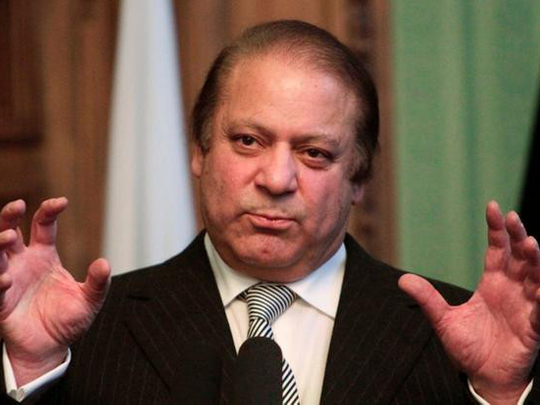
Two contrasting images of Pakistan just in the past week yet again highlighted adversity surrounding the country as opposed to space for progressive change.
On Friday, Pakistanis were reminded once again of the militant challenge that engulfs their country, when Pakistani officials announced the arrest of about 100 hardcore militants who were planning to break into a well fortified prison in the southern city of Hyderabad. Though the plan failed to come together, the arrests suggest the grave possibility of violent groups continuing to agitate for challenging the authority of the Pakistani state. A silver lining may well have been the success of the Pakistan army and the intelligence services supporting it in thwarting this serious plot.
If the plot were successful, the consequences for Pakistan may have ranged from a further erosion of popular confidence in the ruling structure to a significant success emboldening hardcore militants.
The arrests announced on Friday came just a week after the three-day annual Karachi Literature Festival, or KLF, aptly described by some as a breath of fresh air. The scores of visitors attracted to the book stalls and discussions about the works of powerful authors, ranged from low income professionals to smartly dressed college students, and from burqa-clad young women and bearded men to the elderly, including those who came in wheelchairs. The general picture at the KLF pointed towards an often ignored side of Pakistan. The passion for new books may often take readers to libraries or specially arranged reading sessions. However, Pakistan has seen the number of libraries and places for literary gatherings seemingly shrink over time. There are far too few libraries to suit the needs of its population.
And yet, the Karachi book fair and the people who attended this event amply demonstrated that there is more than just a fringe among Pakistan’s population, which is seeking to widen the space for liberal values. This is a crucial asset for the country as it continues the fight against hardline militants who are seeking to gain control of parts of the country. The Karachi event was a powerful reminder of an often ignored side of Pakistan. Though Karachi is notorious for being home to some of the most hardcore gangs active in Pakistan, life in Karachi also presents an opportunity to explore the more liberal fabric of Pakistan.
These two images of Pakistan represent two equally significant trends; a reason for despair given fears about militancy that stand in contrast to the pushback that comes from the country’s more liberal values, which maintains a strong enough presence in the mainstream to remain more than just merely visible. The jury is still out in terms of the ultimate outcome of these two diagonally opposed trends.
As Pakistan battles to stabilise itself, the future will critically depend on where policy makers choose to take the country. Here, the gap between glaring and powerful realities as opposed to equally compelling needs will indeed seal the fate for Pakistan’s future. Inspite of the tens of thousands who attended the KLF, Karachi also remains home to Pakistan’s largest slum localities. Across the city, a significant chunk of the local population lives in almost shanty like neighbourhoods without ample access to clean drinking water, an assured supply of electricity and above all personal security. Conditions surrounding the last mentioned just over the past year say much about the critical flaws in the way Pakistan has recently been run.
Security improvement
In the past year, security conditions in Karachi have shown a relative improvement following a popular military crackdown ordered by General Raheel Sharif, Pakistan’s well respected army chief. Led by a Pakistan army section known as the Rangers, the crackdown witnessed army troops comb through neighbourhood after neighbourhood to clear out militants who had dominated their areas for years. But Pakistan’s political elite — in this case the Pakistan People’s Party or PPP of former president Asif Zardari, which rules over the province of Sindh, of which Karachi is the capital, recently sought to block the extension of the Rangers’ tenure for continuing with their security-related functions. The PPP’s move was widely seen to have been a reaction to the arrest of one of Zardari’s closest former aides.
Meanwhile, elsewhere across Pakistan, prime minister Nawaz Sharif and his ruling Pakistan Muslim League — Nawaz or PML-N continue to take credit for pushing ahead with an anti-terrorism campaign. Nothing of course could be further from the truth. The progress made on this front in the past year has largely been driven by the Pakistan army’s push to begin cleaning up the country.
Abject poverty
At the same time, the Sharif government appears to be visibly failing on key fronts related to rejuvenating a half moribund economy, notwithstanding official claims to fame. Sharif’s trip to Qatar and the signing of a new gas deal just in the past week has been highlighted as a major impetus for Pakistan’s economic prospects, possibly marking an end to stubborn energy shortages. And yet, well over one-third of Pakistan’s population lives below the poverty line or indeed surrounded by abject poverty. In the past year, an all too visible crisis has engulfed Pakistan’s rural segments in the wake of a sharp fall in prices of farm produce.
Well over half of Pakistan’s population lives in its villages. In sharp contrast to the urgent need for addressing what ails Pakistan’s flagging farming economy, Sharif’s government continues to push ahead with major infrastructure projects such as fancy highways, new train networks and urban bus projects. Consequently, the writing on the wall is all too clear; there’s no guarantee of Pakistan’s success stories turning into permanent and progressive improvement unless the broad direction is radically changed.
Farhan Bokhari is a Pakistan-based commentator who writes on political and economic matters.












